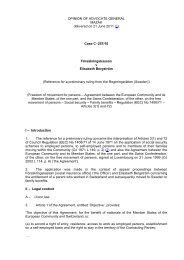Study on non-legislative initiatives for companies to promote gender ...
Study on non-legislative initiatives for companies to promote gender ...
Study on non-legislative initiatives for companies to promote gender ...
You also want an ePaper? Increase the reach of your titles
YUMPU automatically turns print PDFs into web optimized ePapers that Google loves.
Gender equality <strong>initiatives</strong> 11<br />
These pros have <strong>to</strong> be c<strong>on</strong>trasted with the obstacles and challenges <strong>for</strong> the<br />
<strong>initiatives</strong>:<br />
• Diversity of participating enterprises: Initiatives promoting <strong>gender</strong> equality<br />
are well known am<strong>on</strong>g <strong>companies</strong> which are aware of the importance of<br />
corporate social resp<strong>on</strong>sibility. Thus, participati<strong>on</strong> rates are high am<strong>on</strong>g the<br />
“usually suspects” which are also active in <strong>initiatives</strong> with another CSR or<br />
diversity focus. This entails two questi<strong>on</strong>s: How could other enterprises be<br />
motivated <strong>to</strong> bring new principles in<strong>to</strong> the company’s organisati<strong>on</strong>? And how<br />
can a “dis<strong>to</strong>rti<strong>on</strong> of competiti<strong>on</strong>” be avoided so that new participants have a real<br />
chance <strong>to</strong> compete?<br />
• Participati<strong>on</strong> of SMEs: Many resp<strong>on</strong>sible organisati<strong>on</strong>s report <strong>on</strong> the<br />
difficulties <strong>to</strong> recruit SMEs as they often lack a systematic HR policy and thus,<br />
do not see themselves as a target group of the <strong>initiatives</strong>.<br />
• Participati<strong>on</strong> in times of ec<strong>on</strong>omic crisis: Gender equality and social<br />
resp<strong>on</strong>sibility is often seen as an additi<strong>on</strong>al target which can be aimed at if the<br />
company’s results are satisfac<strong>to</strong>ry. In times of ec<strong>on</strong>omic crisis and negative<br />
business per<strong>for</strong>mance these additi<strong>on</strong>al targets are often sacrificed <strong>for</strong> the core<br />
business issues.<br />
• Balance between quality and accessibility: N<strong>on</strong>-<strong>legislative</strong> <strong>initiatives</strong> rely <strong>on</strong><br />
the voluntary participati<strong>on</strong> of <strong>companies</strong> and there<strong>for</strong>e must orient their<br />
organising principles <strong>to</strong> the requirements of the <strong>companies</strong>. However, the<br />
<strong>initiatives</strong> will <strong>on</strong>ly be assessed as valuable in societal terms if the requirements<br />
<strong>for</strong> participati<strong>on</strong> are sufficiently demanding, if standards and practices address<br />
crucial areas and induce sustainable change, and if this is actually evaluated so<br />
that the <strong>companies</strong> can serve as real role models.<br />
Benefits and challenges from an enterprise perspective<br />
Although more and more enterprises commit themselves <strong>to</strong> corporate social resp<strong>on</strong>sibility,<br />
a resp<strong>on</strong>sible management will <strong>on</strong>ly implement voluntary measures if the<br />
enterprise itself can benefit from this, i. e. if it can be seen as a business case. Positive<br />
impacts of participating in a n<strong>on</strong>-<strong>legislative</strong> <strong>gender</strong> equality initiative include:<br />
• Recogniti<strong>on</strong> <strong>for</strong> the company: The participati<strong>on</strong> in such <strong>initiatives</strong> often does<br />
not initiate <strong>to</strong>tally new processes in the company but puts spotlight <strong>on</strong> acti<strong>on</strong>s<br />
already existing. As large enterprises are nowadays requested by cus<strong>to</strong>mers<br />
and business partners <strong>to</strong> show engagement in CSR/diversity the signing of a<br />
charter, a label or being awarded is an external “proof” of the engagement.<br />
• Tool <strong>for</strong> internal communicati<strong>on</strong>: The external proof is a perfect <strong>to</strong>ol <strong>for</strong><br />
internal communicati<strong>on</strong> as it is a symbol <strong>for</strong> the managements’ principles and<br />
can support the internal marketing. The participati<strong>on</strong> in (well-)known <strong>initiatives</strong><br />
can make commitments within the staff clear.<br />
• Positive internal effects <strong>on</strong> employees: The communicated social resp<strong>on</strong>sibility<br />
taken by the employer leads <strong>to</strong> a positive attitude of the employees<br />
<strong>to</strong>wards the enterprise as it shows the esteem of the management <strong>to</strong>wards its<br />
staff. Motivated and loyal staff will lead <strong>to</strong> a decrease in fluctuati<strong>on</strong>.
















